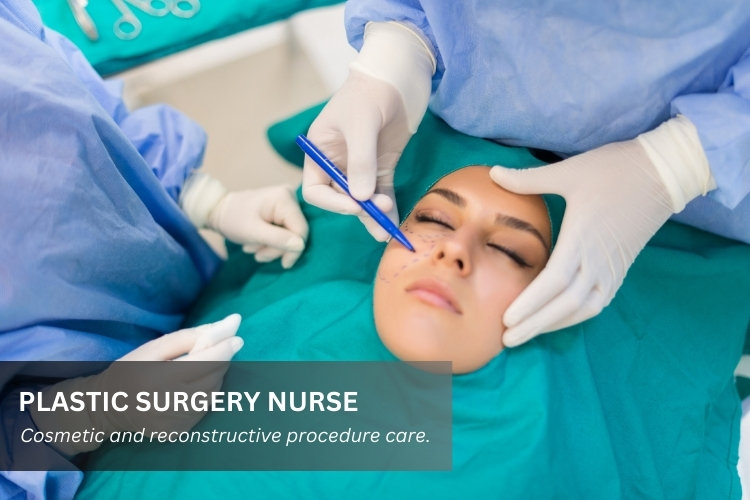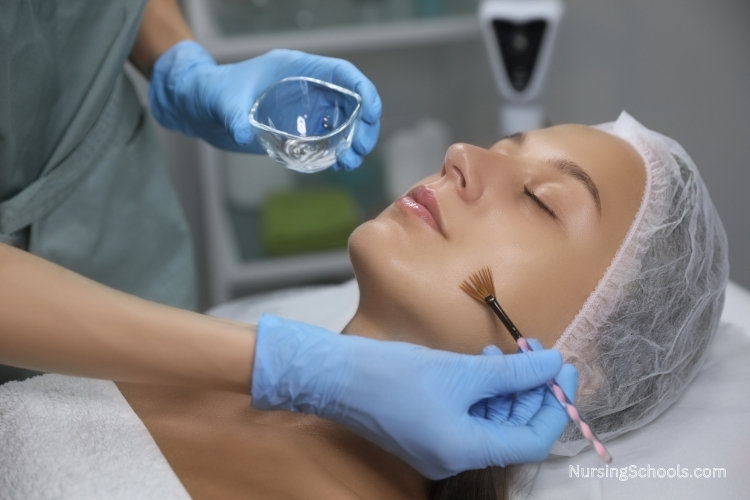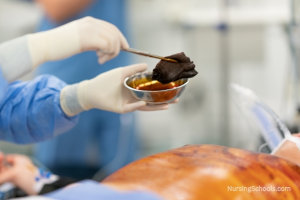Plastic Surgery Nurse
Healthcare Career Guide

Overview
What Is a Plastic Surgery Nurse?
A Plastic Surgery Nurse is a specialized Registered Nurse (RN) who provides preoperative, intraoperative, and postoperative care for patients undergoing cosmetic or reconstructive surgery. These nurses assist plastic surgeons in both elective aesthetic procedures and medical reconstructive surgeries for trauma, burns, and congenital deformities.
Plastic Surgery Nurses work in private clinics, hospitals, and outpatient surgical centers, supporting patients through their surgical journey. They monitor patient progress, manage post-surgical pain, provide wound care, and educate patients on recovery expectations.
This career requires strong clinical skills, patient education abilities, and an understanding of both cosmetic and reconstructive surgical procedures.
Education
How Do I Become a Plastic Surgery Nurse?
Becoming a Plastic Surgery Nurse requires a nursing education, clinical experience, and specialized training in surgical and aesthetic procedures. Follow these steps to enter this challenging and rewarding healthcare career:
- Earn a Nursing Degree. Complete an Associate Degree in Nursing (ADN) or Bachelor of Science in Nursing (BSN). A BSN is preferred for advanced opportunities in surgical and aesthetic nursing.
- Pass the NCLEX-RN. Obtain your nursing license by passing the National Council Licensure Examination for Registered Nurses (NCLEX-RN).
- Gain Clinical Experience. Work as a Registered Nurse (RN) in surgical units, operating rooms, or outpatient surgery centers to develop expertise in perioperative care.
- Pursue Plastic Surgery Certification. Obtain certification through the Plastic Surgical Nursing Certification Board (PSNCB), such as the Certified Plastic Surgical Nurse (CPSN) credential.
- Continue Professional Development. Stay updated on advancements in plastic surgery, non-invasive cosmetic procedures, and wound care techniques through continuing education and professional workshops.
On average, it takes 4-6 years to become a Plastic Surgery Nurse, including nursing school, licensure, and specialized training. Certifications enhance job opportunities and credibility in this field.

Average Salary
How Much Does a Plastic Surgery Nurse Make?
Salaries for Plastic Surgery Nurses vary based on location, experience, and the type of procedures they assist with. On average, a Plastic Surgery Nurse can expect to earn between $80,000 and $115,000 annually.
Average annual salary for a Plastic Surgery Nurse:
- Entry-level: $80,000 - $90,000 per year.
- Mid-career: $90,000 - $105,000 per year.
- Experienced: $105,000 - $115,000 per year.
The U.S. Department of Labor reports that Plastic Surgery Nurses earn an average hourly wage of approximately $42.00 per hour. Assuming a 40-hour workweek, this equates to an annual salary of $87,360. The lowest 10% earn less than $37.00 per hour, while the highest 10% earn more than $50.00 per hour, resulting in an annual salary range of $76,960 to $104,000 per year.
Job Duties
What Does a Plastic Surgery Nurse Do?
Plastic Surgery Nurses provide specialized care before, during, and after cosmetic or reconstructive procedures. Their role includes surgical assistance, patient education, and post-surgical monitoring.
The most common job duties of a Plastic Surgery Nurse:
- Preparing Patients for Surgery. Conduct preoperative assessments, explain procedures, and review patient medical histories.
- Assisting in Surgical Procedures. Provide support in both invasive and non-invasive cosmetic treatments, including liposuction, rhinoplasty, breast augmentation, and facelifts.
- Monitoring Post-Surgical Recovery. Assess vital signs, manage wound care, and watch for complications such as infections or blood clots.
- Providing Pain Management. Administer pain relief medications and recommend non-pharmacological comfort measures.
- Educating Patients on Recovery. Guide patients through postoperative care instructions, including activity restrictions and wound healing.
- Supporting Non-Surgical Aesthetic Procedures. Assist with Botox, dermal fillers, laser treatments, and chemical peels.
- Collaborating with Plastic Surgeons. Work closely with surgeons to optimize patient outcomes and ensure seamless care coordination.
- Advanced Duties. Experienced Plastic Surgery Nurses may specialize in advanced aesthetic procedures, practice in medical spas, or take on leadership roles in surgical centers.
Plastic Surgery Nurses primarily work in cosmetic surgery clinics, hospitals, outpatient surgical centers, and dermatology practices. Their role is essential in ensuring safe procedures and positive patient experiences.

Essential Skills
What Skills Does a Plastic Surgery Nurse Need?
Plastic Surgery Nurses require a blend of surgical knowledge, patient education skills, and attention to detail to assist with cosmetic and reconstructive procedures. These skills help ensure patient safety and satisfaction.
Here are some of the skills a Plastic Surgery Nurse needs to succeed:
- Surgical Assisting. Assist with both cosmetic and reconstructive procedures, ensuring sterile technique and precision.
- Wound Care Management. Provide post-surgical wound care, monitor for complications, and support optimal healing.
- Pain Management. Administer medications and recommend non-pharmacological pain relief strategies.
- Patient Education. Guide patients through preoperative preparation and post-surgical recovery.
- Critical Thinking. Assess patient conditions and recognize signs of complications.
- Communication. Explain surgical procedures and expected outcomes to patients in a clear and reassuring manner.
- Attention to Detail. Ensure precision in surgical prep, documentation, and post-procedure care.
- Collaboration. Work closely with plastic surgeons, anesthesiologists, and medical spa professionals to ensure optimal patient care.
One of the biggest challenges of being a Plastic Surgery Nurse is managing patient expectations regarding cosmetic procedures. However, the role is highly rewarding, as it allows nurses to help patients improve their confidence and quality of life.
Last updated: March 9, 2025
References:
- Registered Nurses. Bureau of Labor Statistics, U.S. Department of Labor. Occupational Outlook Handbook. Retrieved March 9, 2025.
- NCLEX Nurse Licensure Exam. National Council of State Boards of Nursing (NCSBN). Retrieved March 9, 2025.
- How To Become a Plastic Surgery Nurse in 6 Steps. Indeed, Healthcare Career Guide. Retrieved March 9, 2025.
- Plastic Surgery Nurse Salary in the United States. ZipRecruiter, Healthcare Career Path. Retrieved March 9, 2025.
- Plastic Surgery Nurse. Johnson & Johnson, Nursing Careers. Retrieved March 9, 2025.
- Get Certified: CANS, CPSN. Plastic Surgical Nursing Certification Board (PSNCB). Retrieved March 9, 2025.
- Plastic Surgical Nursing. International Society of Plastic and Aesthetic Nurses (ISPAN). Retrieved March 9, 2025.
- Facial Plastic and Reconstructive Procedures. American Academy of Facial Plastic and Reconstructive Surgery (AAFPRS). Retrieved March 9, 2025.
- Who may inject Botox in California. Medical Board of California, Cosmetic Treatments FAQ. Retrieved March 9, 2025.
- Botox Courses and Injector Training for RNs. The American Academy of Facial Esthetics (AAFE). Retrieved March 9, 2025.
- Plastic and Reconstructive Procedures at Jefferson Health. Thomas Jefferson University, Sidney Kimmel Medical College. Retrieved March 9, 2025.
- What does an aesthetic nurse do. Rasmussen College, Nursing Career Guide. Retrieved March 9, 2025.


